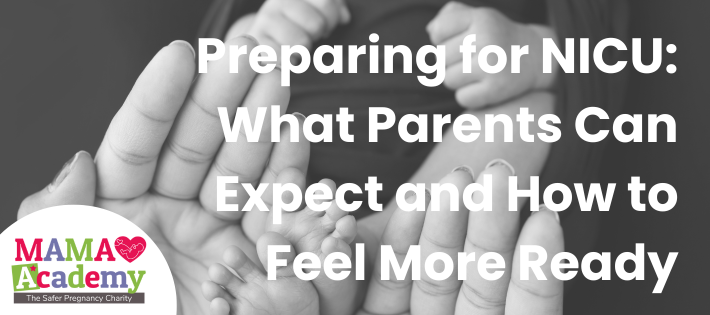Preparing for NICU: What Parents Can Expect and How to Feel More Ready
Published on: 08/11/2025
No one imagines their baby needing neonatal care, and many parents describe NICU as a world they didn’t realise they needed to understand until they were suddenly living it. Whether you’ve been told your baby may arrive early, or you simply want to feel more prepared “just in case,” having gentle, realistic information can make this unknown feel a little less overwhelming.
NICU is a place built on expert care, compassion and constant monitoring. It’s also a place where parents still matter enormously, your presence, your voice, and your choices continue to play a vital role in your baby’s care, even when things feel out of your hands.
This guide offers simple, supportive ways to prepare emotionally and practically for the possibility of NICU.
Understanding what NICU is
NICU (Neonatal Intensive Care Unit) supports babies who are born prematurely, smaller than expected, or who need extra help with breathing, feeding or stabilisation. Babies in NICU receive constant observation and tailored medical support from a dedicated neonatal team.
For parents, NICU can feel clinical at first, but it is also a place of protection and hope, a stepping stone on your baby’s journey home.
Building a NICU-aware birth plan
Even when birth plans change, you still have choices. A NICU-aware birth plan can help your team understand what matters to you if your baby needs specialised care.
You might want to include:
Skin-to-skin when possible
Skin-to-skin contact can often happen in NICU, even with wires and monitors, sometimes in short bursts, sometimes for longer cuddles. Ask your team when it might be appropriate and how they can help make it happen safely.
Feeding and expressing support
If you would like to express breastmilk, your team can help you get started with equipment, pumps and guidance. Many units encourage parents to begin expressing early, as even small amounts can benefit preterm babies.
Who you want with you
Consider who you’d like supporting you during birth and in the early NICU period. Your partner, family member or chosen supporter can often stay with you or visit alongside you, depending on the unit’s policies.
Communication preferences
Think about how you like to receive updates, face-to-face conversations, written notes, or regular check-ins. Let your team know who should be included in key discussions and decisions.
What to pack (if you think NICU might be needed)
A few items can help you feel more grounded:
-Comfortable layers for you (NICUs can be warm)
-A notebook for questions, updates and feeding/expressing notes
-Phone charger
-A soft muslin or cloth that carries your scent (some units place this near your baby)
-A small washbag with basics in case your stay is longer than planned
You won’t need to pack for your baby, the unit provides everything they need.
Taking care of yourself in NICU
NICU is emotionally intense. Parents often describe feeling proud, anxious, hopeful, exhausted and overwhelmed all at once. It’s normal to find this period challenging.
A few grounding reminders:
-You are still your baby’s parent — your voice, touch and presence matter.
-Ask questions freely — the team are there to explain, reassure and support you.
-Take breaks — stepping out to eat, rest or breathe is not abandoning your baby; it’s caring for yourself so you can care for them.
-Your emotions are valid — NICU is a marathon, not a sprint. Be gentle with yourself.
You don’t need to prepare alone
Preparing for NICU isn’t about expecting the worst, it’s about giving yourself the knowledge and confidence to navigate whatever happens. Information won’t remove the uncertainty, but it can soften it.
If NICU becomes part of your journey, you won’t face it alone. You’ll be surrounded by professionals who hold both expertise and compassion, and you’ll discover your own strength in ways you never expected.
Your instincts, your presence and your love remain powerful, no matter where your baby’s first days are spent.
